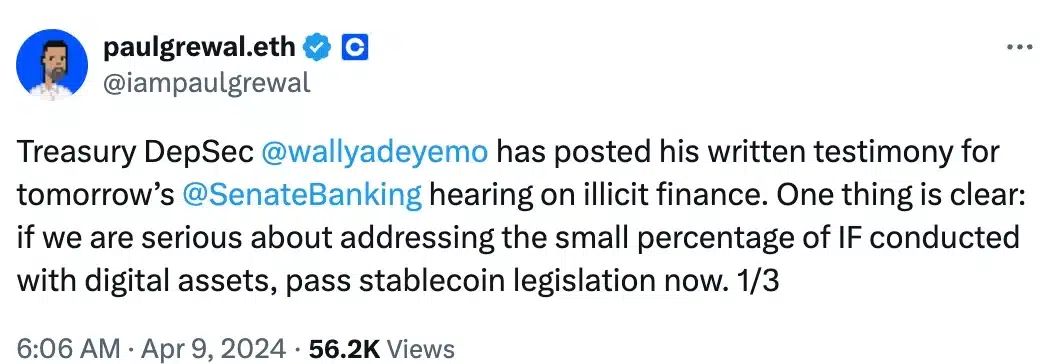- Concerns were raised about stablecoin regulation and national security implications.
- Ex-CFTC chair Massad stressed the need for stablecoin regulation to prevent illicit activities.
The entire cryptocurrency market seems to be experiencing a downturn, with Bitcoin [BTC] and various other cryptocurrencies showing red candlesticks on their daily and weekly charts. Amidst this, concerns about stablecoin regulation have also come into play.
Agencies like the Commodity Futures Trading Commission (CFTC) and Security and Exchange Commission (SEC) are navigating the classification and regulation of cryptocurrencies.
But according to some, they’re lacking in developing a proper regulatory framework for stablecoins, despite an increasing number of people using them in place of USD.
The absence of regulatory oversight for stablecoins specifically begs the question – can stablecoins endanger national security, given their central role in crypto trading?
The current state of stablecoin
Recent instances of the SEC scrutinizing various crypto firms indicate that the U.S. government might not favor cryptocurrencies and by extension stablecoins from a national security perspective.
Additionally, there is concern that the widespread adoption of stablecoins could undermine the U.S.’s ability to impose sanctions effectively.
Providing instances on the same, Timothy Massad, the Obama-appointed chair for the CFTC in a recent conversation with Bankless podcast said,
“Hamas is using crypto and stablecoins to some extent. Similarly, there were reports that Russians were using Tether to buy arms and evade sanctions, so I think it is happening.”
Massad believes that since stablecoins settle on decentralized blockchains, this may pose a challenge in terms of tracking and regulating transactions effectively.
Hence, he called for a regulatory framework to ensure that everyone follows the law and prevents illegal activities in the cryptocurrency sector.
The need for stablecoin legislation
In his 17th April blog post titled – Stablecoins and national security: Learning the lessons of Eurodollars – Massad drew parallels between stablecoins and Eurodollars and added,
“Both stablecoins and Eurodollars are U.S. dollar-based liabilities that had their origins outside the regulated banking system.”
Here he pointed out that despite being overlooked initially, Eurodollars eventually became a key part of the global financial system, supporting the dollar’s dominance, and U.S. financial power.
Hence, a question that pops up here is – Will stablecoins achieve a similar future?
Echoing the need for stablecoin legislation various execs have already expressed their concerns in the past as noted by, Coinbase’s Chief Legal Officer (CLO), Paul Grewal.

Source: Paul Grewal/X
Thus, while certain members of Congress, such as Senators Cynthia Lummis and Kirsten Gillibrand, have shown awareness by introducing the Lummis-Gillibrand Payment Stablecoin Act, there remains a lack of consensus on clear regulations.
Credit: Source link



